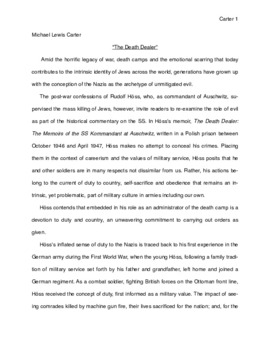The Death Dealer Undergraduate
| dc.contributor.author | Carter, Michael Lewis | en_US |
| dc.contributor.editor | Blanchard, Tessa | en_US |
| dc.contributor.editor | Carter, Michael | en_US |
| dc.contributor.editor | Geary, Ryan | en_US |
| dc.contributor.editor | Renner, Scott | en_US |
| dc.contributor.editor | Riley, Meghan | en_US |
| dc.date.accessioned | 2016-11-15T21:52:03Z | |
| dc.date.accessioned | 2021-04-14T15:12:55Z | |
| dc.date.available | 2016-11-15T21:52:03Z | |
| dc.date.available | 2021-04-14T15:12:55Z | |
| dc.date.issued | 2012-10-01 | en_US |
| dc.identifier.uri | https://hdl.handle.net/11244.46/1197 | |
| dc.description | Review of Books | en_US |
| dc.description.abstract | The post-war confessions of Rudolf Höss, who, as commandant of Auschwitz, supervised the mass killing of Jews, however, invite readers to re-examine the role of evil as part of the historical commentary on the SS. In Hössʼs memoir, The Death Dealer: The Memoirs of the SS Kommandant at Auschwitz, written in a Polish prison between October 1946 and April 1947, Höss makes no attempt to conceal his crimes. Placing them in the context of careerism and the values of military service, Höss posits that he and other soldiers are in many respects not dissimilar from us. Rather, his actions belong to the current of duty to country, self-sacrifice and obedience that remains an intrinsic, yet problematic, part of military culture in armies including our own. | en_US |
| dc.description.uri | http://history.ou.edu/journal | en_US |
| dc.relation.ispartofseries | OU historical journal ; 1 (Fall 2012) | en_US |
| dc.title | The Death Dealer | en_US |
| dc.contributor.sponsor | Folsom, Raphael | en_US |
| dc.contributor.sponsor | Holguín, Sandie | en_US |
| dc.contributor.sponsor | Levenson, Alan | en_US |
| dc.description.undergraduate | undergraduate |
